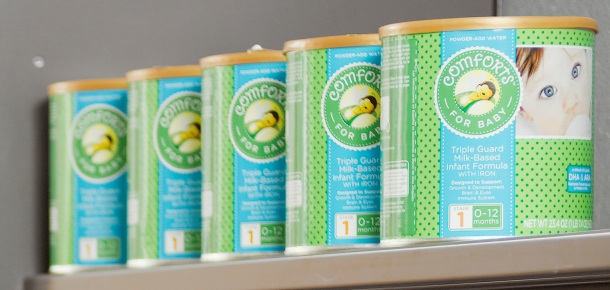“The art and science of asking questions is the source of all knowledge.” –Thomas Berger
A little more than three years ago, we started asking better questions in the Pediatric Primary Care Center (PPCC) to screen our infant patients and their families for availability of adequate food. This week, we’ve published results of a study that show how those questions – and our ability to help if the answers indicate that a family needs help – may be leading to improved nutrition for more infants in our community and more consistent well-child check-ups.
The Keeping Infants Nourished and Developing (KIND) Program is a partnership between the Cincinnati Children’s Primary Care Centers and the Freestore Foodbank that enables our staff in the PPCC to provide a can of formula and a pack of diapers if a family is determined to be food insecure. Additionally, we have the opportunity to connect each family to community resources that can help them participate in programs to give them the hand up that they may need. These small steps are translating to more families whose basic needs are fulfilled and more infants who are growing, thriving and hopefully ultimately meeting their full developmental potential.
I’ve been involved with the program since its inception and am proud of what we are able to do for our patients and their families. Many pediatricians have heard of parents stretching formula – either diluting it or feeding the baby less frequently – to make it last, but have been unable to intervene. Unfortunately poor nutrition can adversely affect a child’s health, development, and behavior. We also recognize that if a baby is hungry, the rest of the family is likely hungry too and now we can help.
Our access to patients and opportunity to ask them the right questions in a safe and caring environment has been crucial to the success of this program. From there, we rely on the expertise of the Freestore Foodbank to be able to provide the can of formula and linkages to a variety of community resources. We believe that the caring and empathetic relationships we are trying to build with all of our families is leading to more consistent well-child checkups with appropriate immunizations and screening and ultimately healthier children and families. As a primary care pediatrician, these are the things that I want for every single one of my patients. I want them to thrive, learn and develop to their utmost potential.
Although some individuals have expressed their opinions that “hand-outs” don’t work, we believe that our support is a hand-UP. We, as pediatricians, are uniquely positioned to identify infants and children in need and serve as an access point to community organizations, like the Freestore Foodbank and United Way, which have the expertise to make a lasting impact for these families.
The publication of these study results is a significant milestone for the KIND Program. It provides initial evidence that addressing families’ basic needs with food and diapers, for example, may increase their engagement with the medical system and lead to better adherence to recommended well-child care, hopefully improving the health of children in our community.
We’ve had several individuals inquire about donating to support this program and if you are interested in doing so, please don’t hesitate to contact the Freestore Foodbank at 513-859-7546 to make arrangements and earmark your contribution for KIND.





